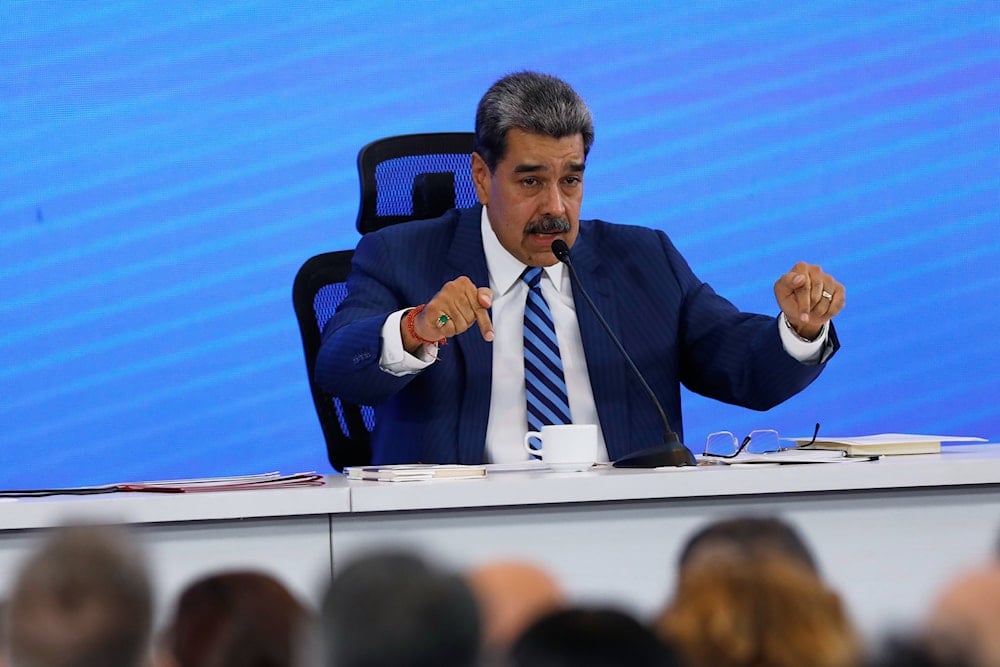Venezuela will not abandon the sacred cause of Palestine: Maduro
Maduro, speaking from Caracas, declared Venezuela’s unwavering support for Palestine and stressed that peace is impossible without justice for the Palestinian people.
-

Venezuela's President Nicolas Maduro speaks at a conference on international law in Caracas, Venezuela, on November 14, 2025. (AP Photo/Cristian Hernandez)
On the occasion of Palestinian Independence Day, Venezuelan President Nicolás Maduro reiterated his country’s firm and unconditional support for the Palestinian cause, describing it as "the most sacred of all."
Speaking from Caracas, Maduro stressed Venezuela’s commitment to a "comprehensive and legitimate agreement" that secures the rights of the Palestinian people. "We will not abandon this sacred cause until the ultimate goal is achieved: Palestine will rise, free and independent," he declared.
Marking November 15, Palestine’s Independence Day, Maduro emphasized that the Palestinian people possess an undeniable right to life, peace, and the establishment of an independent state. He added that despite current ceasefire arrangements, true peace cannot be achieved without justice. “We will only reach real peace when justice is served for the crimes and genocide committed. Only then can we begin to recover from the rubble and devastation,” he said, affirming Venezuela’s call for justice.
Maduro also stressed the importance of mobilizing global public opinion to end what he described as the ongoing cycle of “massacres followed by agreements," affirming Venezuela’s commitment to supporting the reconstruction of Gaza and standing by the Palestinian people. “This will be a historic moment of dignity and pride,” Maduro concluded, referring to the day Palestine achieves full independence.
Maduro's relationship with Palestine
Maduro’s advocacy for the Palestinian cause is portrayed as a consistent and long‑term pillar of his foreign policy, rooted in a Bolivarian, anti‑imperialist worldview that treats Palestine as a central moral and political reference point. In earlier coverage of his statements, he is shown declaring that Venezuela is "on the front lines with Palestine," urging urgent international summits to stop aggression on Gaza, and denouncing global silence on the killings of Palestinians as a "moral crime."
This pattern includes repeated affirmations of “unwavering support” for Palestinian rights, open condemnation of what he calls genocide in Gaza, and promises that Venezuela will provide humanitarian assistance to the Strip, situating his stance alongside broader regional resistance to Israeli and US policy.
More recent reports deepen this trajectory by emphasizing how Maduro moves from rhetoric to concrete proposals and sharper legal‑political language. In his reaction to the Sharm el‑Sheikh ceasefire, he describes the Palestinian cause as "the most sacred cause of humanity," cites massive casualty figures from the war on Gaza, and warns that any agreement without justice will be a mere “peace of rubble,” insisting instead on reconstruction of Gaza, recognition of al‑Quds as the capital of a Palestinian state, and guarantees of Palestinian sovereignty and elected governance.
In parallel, he calls UN silence on Gaza “complicit and cowardly,” urges people to “stay in the streets” for Palestinian rights, and reiterates that Venezuela will send aid and stand firmly with Palestine, underscoring a long‑running narrative of solidarity that blends moral outrage, street mobilization, and concrete state commitments.

 3 Min Read
3 Min Read










